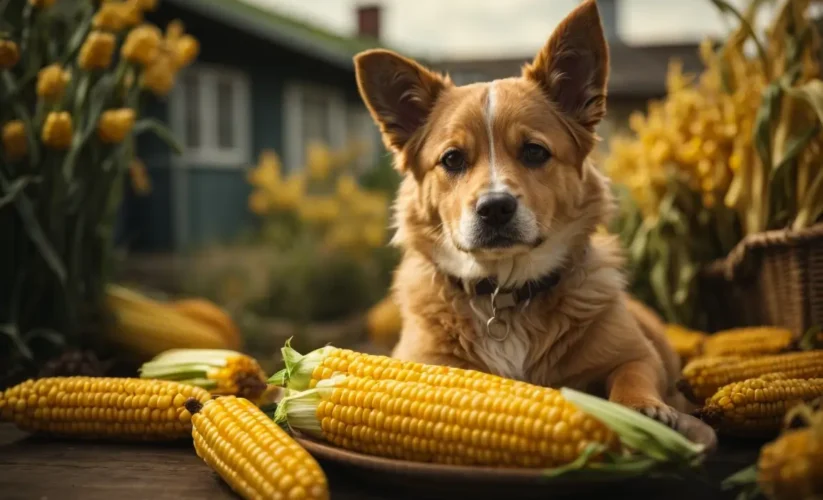Can Dogs Eat Tomatoes?

Welcome to the world of pet parenting, where every food choice can significantly impact our furry friends’ well-being. As a dedicated dog owner and experienced blogger, I often find myself navigating the complex world of canine nutrition. One frequently asked question is, “Can dogs eat tomatoes?” It seems simple, yet it’s layered with nuances. This blog post aims to provide a thorough exploration of this topic, ensuring that you, as a responsible dog owner, are equipped with the necessary knowledge to make the best dietary choices for your four-legged companion.
Tomatoes, a common household food, are more than just a culinary delight. They are packed with essential nutrients that offer various health benefits. But when it comes to sharing them with our dogs, caution is key. Understanding the benefits and potential risks associated with feeding tomatoes to dogs, or wondering ‘can dogs eat tomatoes?’, is crucial for their health and happiness. In this post, we will delve into the pros and cons of tomatoes in a dog’s diet, explore other safe fruit options, and offer final thoughts to guide you in your journey as a conscientious pet parent.
Is Tomatoes Good for Dogs?
The topic of feeding tomatoes to dogs, often summarized as ‘can dogs eat tomatoes’, is layered with various considerations, from nutritional benefits to appropriate quantities. Tomatoes are a source of several essential nutrients that can be advantageous for dogs when included in their diet correctly.
Nutritional Benefits of Tomatoes for Dogs:
- Vitamins and Minerals: Tomatoes are rich in vitamins A, C, and K, essential for maintaining good vision, skin health, and immune function in dogs. They also contain potassium, which is vital for proper muscle and nerve function.
- Antioxidants: The presence of antioxidants like lycopene in tomatoes helps in combating free radicals, reducing the risk of chronic diseases, and promoting overall health. Lycopene is particularly beneficial for heart health and may lower the risk of certain diseases.
- Dietary Fiber: Tomatoes contain dietary fiber, which aids in digestion and helps maintain a healthy gut. It can also contribute to weight management by providing a sense of fullness.
Moderation and Preparation: While tomatoes can be a healthy addition to a dog’s diet, they should be introduced in moderation. Gradual introduction allows you to monitor your dog’s reaction and ensure there are no adverse effects, like gastrointestinal upset. Ripe, red tomatoes are generally safer than unripe, green ones due to lower levels of potentially harmful substances. Additionally, it’s essential to serve tomatoes plain, without any added seasonings or ingredients that could be harmful to dogs.
Potential Health Benefits: Incorporating tomatoes into your dog’s diet can have several health benefits. The antioxidants can support a healthy aging process and reduce inflammation. Vitamins A and C are crucial for maintaining good vision and immune health, respectively. Additionally, the potassium content supports cardiovascular health and proper muscle functioning.
Considerations for Specific Health Conditions: For dogs with certain health conditions, tomatoes might offer specific benefits. For example, the low-calorie and high-fiber content can be advantageous for overweight dogs. However, due to their acidity, tomatoes might not be suitable for dogs with acid reflux or sensitive stomachs.
How to Safely Include Tomatoes in Your Dog’s Diet: To safely incorporate tomatoes into your dog’s diet, consider the following guidelines:
- Choose Ripe Tomatoes: Opt for ripe, red tomatoes, as they have lower levels of solanine, a substance that can be harmful in large amounts.
- Wash Thoroughly: Ensure that the tomatoes are thoroughly washed to remove any pesticides or chemicals.
- Serve in Small Quantities: Start with small amounts to see how your dog reacts and to prevent any digestive issues.
- Avoid Processed Tomato Products: Many processed tomato products contain additives like salt, sugar, and spices that are not suitable for dogs.
In summary, while tomatoes can be a healthy treat for dogs, they should be given in moderation and after considering the individual dog’s health and dietary needs. Consulting with a veterinarian is always advisable when introducing new foods into your dog’s diet.
Is Tomatoes Bad for Dogs?
While tomatoes can offer nutritional benefits to dogs, there are potential risks that must be taken into account. The primary concern arises from the fact that tomatoes belong to the nightshade family, which includes plants that contain substances that can be harmful to dogs in large quantities.
Solanine Toxicity: The green parts of the tomato plant, such as the leaves, stem, and unripe green tomatoes, contain a substance called solanine. This toxin can cause gastrointestinal distress, lethargy, weakness, and confusion if ingested in large amounts. It’s essential to ensure that dogs don’t have access to these parts of the plant.
Risks of Green Tomatoes: Unripe tomatoes have higher solanine levels compared to ripe ones. While a small amount may not cause harm, it’s generally safer to avoid feeding green tomatoes to dogs. This caution extends to other nightshade vegetables as well.

Allergic Reactions and Sensitivities: Some dogs may have an allergic reaction to tomatoes, exhibiting symptoms like itching, rashes, or digestive issues. If you observe any adverse reactions, it’s best to remove tomatoes from their diet and consult a veterinarian.
Acidic Nature of Tomatoes: Tomatoes are naturally acidic, which can be problematic for dogs with sensitive stomachs or pre-existing conditions like acid reflux. The acidity can cause discomfort and exacerbate these conditions, so it’s crucial to consider your dog’s individual health when deciding to include tomatoes in their diet.
Precautions for Dogs with Specific Health Conditions: Dogs with certain health conditions should avoid tomatoes. For example, dogs with kidney problems may need to avoid foods high in potassium, like tomatoes. Similarly, dogs with a history of bladder stones or other urinary issues should also be cautious, as tomatoes can contribute to the formation of certain types of stones.
In conclusion, while tomatoes can be a part of a healthy diet for some dogs, they are not suitable for all. Owners should be mindful of the potential risks, especially concerning solanine toxicity and the fruit’s acidic nature. It’s always advisable to consult with a veterinarian before introducing tomatoes or any new food into your dog’s diet, particularly if your dog has specific health issues.
Are Other Fruits Safe For Dogs?
When considering fruits as a part of a dog’s diet, including the often-asked question ‘can dogs eat tomatoes’, it’s essential to understand which fruits are safe and beneficial for dogs and which ones should be avoided.
Safe Fruits for Dogs:
- Apples (Seedless): Apples are a good source of vitamins A and C, and fiber, making them a healthy snack for dogs when seeds are removed.
- Bananas: Bananas are high in potassium, vitamins, biotin, and fiber, but they are also high in sugar, so they should be given in moderation.
- Blueberries: Known for their antioxidant properties, blueberries are great for dogs and can help in maintaining a healthy immune system and good skin health.
- Watermelon (Seedless): Watermelon is hydrating and a good source of vitamins A, B6, and C, but it should be given without seeds and in moderation due to its high sugar content.
Fruits to Avoid:
- Grapes and Raisins: These are extremely toxic to dogs and can lead to acute kidney failure.
- Cherries: The pits, stems, and leaves of cherries contain cyanide, which is toxic to dogs. While the flesh is safe, the risk of ingestion of these parts makes cherries generally unsafe.
- Citrus Fruits: Fruits like oranges, lemons, and limes can cause stomach upset in dogs due to their acidity and should be given sparingly, if at all.
General Guidelines for Feeding Fruits to Dogs:
- Introduce Slowly: Introduce new fruits slowly and in small amounts to monitor for any allergic reactions or digestive issues.
- Preparation is Key: Ensure fruits are properly prepared – peeled, seedless, and cut into appropriate sizes to prevent choking hazards.
- Moderation is Essential: Even safe fruits should be given in moderation due to their sugar content and potential to cause gastrointestinal upset.
In summary, while certain fruits can be a healthy addition to a dog’s diet, it’s crucial to know which ones are safe and to serve them in a way that’s appropriate for your dog. As always, if in doubt, consult with your veterinarian for advice tailored to your dog’s specific dietary needs.
Final Thoughts
In conclusion, addressing the question ‘can dogs eat tomatoes’, it’s clear that tomatoes can be a healthy treat for dogs when offered in moderation and ensuring that only ripe, red tomatoes are given. The key to a balanced diet is diversity and moderation. While tomatoes and certain other fruits can provide additional nutrients and variety to your dog’s diet, they should not replace their regular, balanced dog food.
Always be cautious and informed about the foods you introduce to your pet. If in doubt, consult with your veterinarian, especially when dealing with dogs that have specific health issues or dietary restrictions. Remember, each dog is unique, and what works for one may not suit another. As responsible dog owners, our primary goal is to ensure the health and happiness of our furry companions through informed and thoughtful dietary choices.










